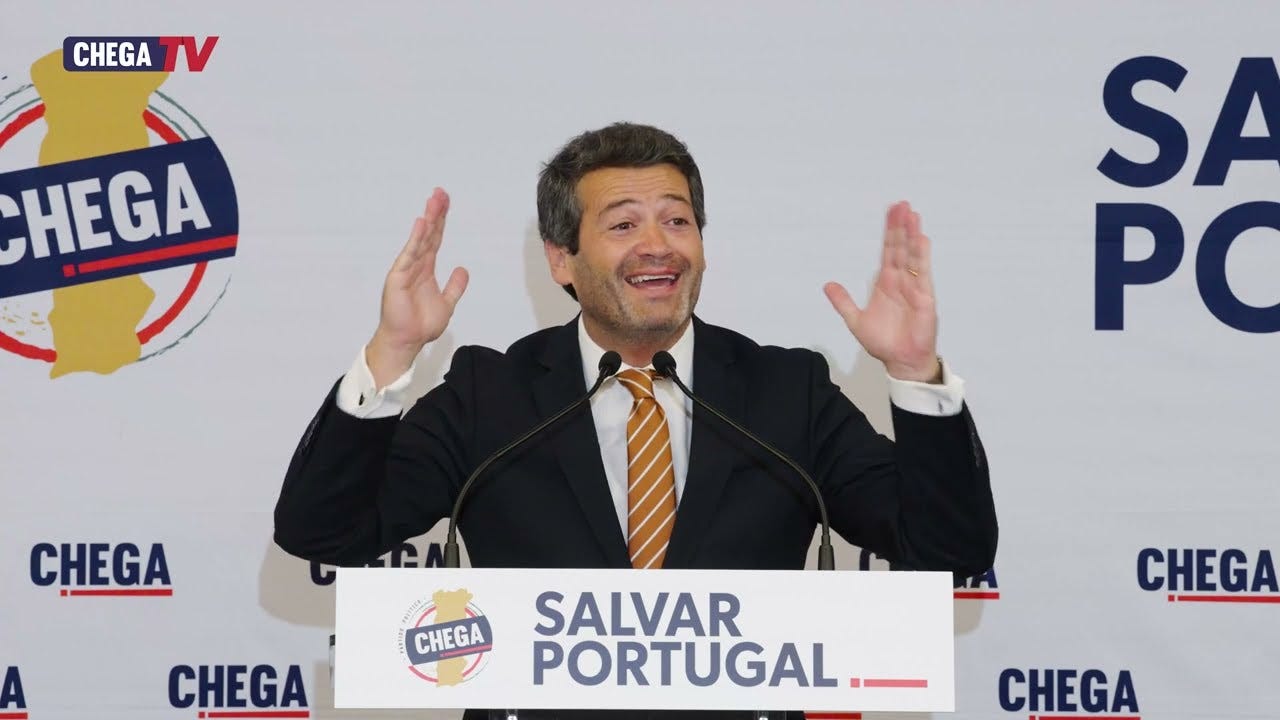Chega becomes second largest party in Parliament
The Socialist Party (PS) failed to win any seats from the overseas vote, a first in the history of elections in Portugal.
It’s confirmed: after the final count of overseas votes from the May 18 general election, Chega will now be the second largest party in the Portuguese Parliament and therefore the “leader of the opposition”.
With the votes from Portuguese citizens abroad now counted, both Chega and the center-right Democratic Alliance (AD) secured one seat each in both overseas electoral districts, Europe and Outside Europe, bringing each party two additional seats in Parliament.
Crucially, the Socialist Party (PS), a dominant force in Portuguese politics since the country's return to democracy in 1974, failed to win any seats from the overseas vote, a first in the history of the external constituencies.
The overseas vote marks a dramatic moment in Portuguese politics, ending decades of Socialist–Social Democratic dominance and traditional bipartisan rule.
However, the Socialists did win more votes than Chega, enabling them to argue that they remain the “leader of the opposition”
Socialist leadership candidate José Luís Carneiro argued on Thursday that the PS (Socialist Party), stated that “the majority of Portuguese chose the PS as the second party,” and that when defining which party is the second strongest, what matters is the number of votes, because “every vote counts”, not the number of seats won in parliament.
“If we value the principle of ‘one person, one vote,’ it means we value every vote. And in the arithmetic where every vote counts, the Socialist Party was the second party with the highest number of votes from the Portuguese electorate,” he added, when asked whether the PS, despite having fewer seats than Chega, still holds the position as the second-largest political force.
Details of the overseas votes
CHEGA secured over 92,000 votes (26%) in the overseas vote and gaining two additional seats in Parliament, bringing its total to 60 MPs.
The Democratic Alliance (AD), led by Luís Montenegro, followed with 16% (56,000 votes) and also won two seats, reclaiming one from the Socialist Party (PS).
For the first time since the return of democracy, PS failed to elect any MPs from emigrant constituencies, finishing third with 13% (around 47,700 votes).
The Liberal Initiative (IL) came fourth, with over 8,000 votes, followed by ecosocialist Livre at 1.88%.
CHEGA dominated the European circle, winning in Belgium, France, Luxembourg, the UK, and Switzerland.
AD led in Germany, Spain, the Netherlands, and parts of Asia and Oceania. PS managed only one win: “Other European countries.”
Outside Europe, AD led in six major regions, including Africa, Canada, the U.S., China, and broader areas of Asia and the Americas.
CHEGA’s only top result beyond Europe was in Brazil, where it repeated its 2024 win with over 25%.
The overseas vote wrapped up with Asia and Oceania, where AD retained its lead (24.27%) despite a decline, while CHEGA edged past PS for second.
The final projected seat count sees the Democratic Alliance with 91 deputies, Chega with 60, and the Socialist Party with 58.
Ventura’s reaction
Chega’s leader André Ventura hailed the results as “a peaceful and healthy regime change.”
Speaking in Lisbon as his party monitored the vote count, Ventura said the results reflect deep dissatisfaction with the political establishment and a desire for systemic reform.
“It’s the end of 50 years of the same. We want to win so that all who voted for us around the world can come back to this great nation, Portugal,” Ventura declared.
He emphasized that Chega dominated both emigration districts, winning around 27% of the vote, compared to AD’s 15.6%, and well ahead of the PS.
“This is a resounding, historic victory," Ventura added, describing it as a mandate for “a profound change in the Portuguese political system.”
Ventura attributed the party’s success among emigrants to their lived experiences: "They know what socialism is. They know what social democracy is. They know corruption. They know subsidy dependency. They fought to overcome it. That’s why they chose Chega."
President nominates PM
With the emigration vote count concluded, Belém called the leaders of the AD, PS, and Chega once again on Wednesday and nominated Luís Montenegro as Prime Minister.
This follows a pledge by José Luís Carneiro, currently the sole candidate for PS leadership, to ensure political stability by supporting the government's program in Parliament.
He also rejected supporting a parliamentary inquiry into the Spinumviva case, promoted by his predecessor.
Meanwhile, Chega’s leader André Ventura has declared his party will be a “beacon of stability,” but has also drawn three red lines and threatened to present an “alternative government.”
It remains unclear whom Montenegro is willing to partner with. For now, he insists on dialogue with all parties, though he firmly rules out any formal coalition or parliamentary agreement with Chega.
What’s Next: A New Government by Early June?
Parliament will hold its first session on June 3 or, at the latest, June 5, during which the speaker and parliamentary leadership will be elected.
José Pedro Aguiar-Branco, speaker of the last legislature, has expressed willingness to stand again.
To win, he’ll need 116 votes, recalling that last year, he was only elected on the fourth ballot, after Chega broke its agreement with AD.
If everything stays on schedule, the new government could take office as early as June 6, just before Portugal Day on June 10.
Otherwise, the swearing-in may occur after the holiday.






Is it possible to assess integrity purely by evaluating physical appearance and mien? I think so. And Ventura just radiates sleaze.
anti-immigrant party wins official opposition status with the help of the immigrant vote? unbelievable!